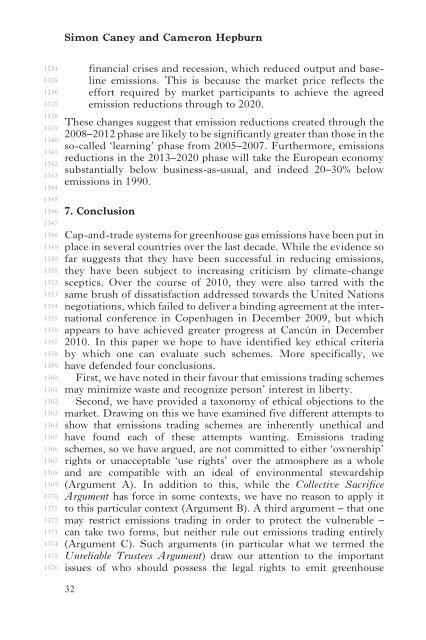Carbon Trading: Unethical, Unjust and Ineffective? - Global ...
Carbon Trading: Unethical, Unjust and Ineffective? - Global ...
Carbon Trading: Unethical, Unjust and Ineffective? - Global ...
Create successful ePaper yourself
Turn your PDF publications into a flip-book with our unique Google optimized e-Paper software.
Simon Caney <strong>and</strong> Cameron Hepburn<br />
1334<br />
1335<br />
1336<br />
1337<br />
1338<br />
1339<br />
1340<br />
1341<br />
1342<br />
1343<br />
1344<br />
1345<br />
1346<br />
1347<br />
1348<br />
1349<br />
1350<br />
1351<br />
1352<br />
1353<br />
1354<br />
1355<br />
1356<br />
1357<br />
1358<br />
1359<br />
1360<br />
1361<br />
1362<br />
1363<br />
1364<br />
1365<br />
1366<br />
1367<br />
1368<br />
1369<br />
1370<br />
1371<br />
1372<br />
1373<br />
1374<br />
1375<br />
1376<br />
financial crises <strong>and</strong> recession, which reduced output <strong>and</strong> baseline<br />
emissions. This is because the market price reflects the<br />
effort required by market participants to achieve the agreed<br />
emission reductions through to 2020.<br />
These changes suggest that emission reductions created through the<br />
2008–2012 phase are likely to be significantly greater than those in the<br />
so-called ‘learning’ phase from 2005–2007. Furthermore, emissions<br />
reductions in the 2013–2020 phase will take the European economy<br />
substantially below business-as-usual, <strong>and</strong> indeed 20–30% below<br />
emissions in 1990.<br />
7. Conclusion<br />
Cap-<strong>and</strong>-trade systems for greenhouse gas emissions have been put in<br />
place in several countries over the last decade. While the evidence so<br />
far suggests that they have been successful in reducing emissions,<br />
they have been subject to increasing criticism by climate-change<br />
sceptics. Over the course of 2010, they were also tarred with the<br />
same brush of dissatisfaction addressed towards the United Nations<br />
negotiations, which failed to deliver a binding agreement at the international<br />
conference in Copenhagen in December 2009, but which<br />
appears to have achieved greater progress at Cancún in December<br />
2010. In this paper we hope to have identified key ethical criteria<br />
by which one can evaluate such schemes. More specifically, we<br />
have defended four conclusions.<br />
First, we have noted in their favour that emissions trading schemes<br />
may minimize waste <strong>and</strong> recognize person’ interest in liberty.<br />
Second, we have provided a taxonomy of ethical objections to the<br />
market. Drawing on this we have examined five different attempts to<br />
show that emissions trading schemes are inherently unethical <strong>and</strong><br />
have found each of these attempts wanting. Emissions trading<br />
schemes, so we have argued, are not committed to either ‘ownership’<br />
rights or unacceptable ‘use rights’ over the atmosphere as a whole<br />
<strong>and</strong> are compatible with an ideal of environmental stewardship<br />
(Argument A). In addition to this, while the Collective Sacrifice<br />
Argument has force in some contexts, we have no reason to apply it<br />
to this particular context (Argument B). A third argument – that one<br />
may restrict emissions trading in order to protect the vulnerable –<br />
can take two forms, but neither rule out emissions trading entirely<br />
(Argument C). Such arguments (in particular what we termed the<br />
Unreliable Trustees Argument) draw our attention to the important<br />
issues of who should possess the legal rights to emit greenhouse<br />
32
















